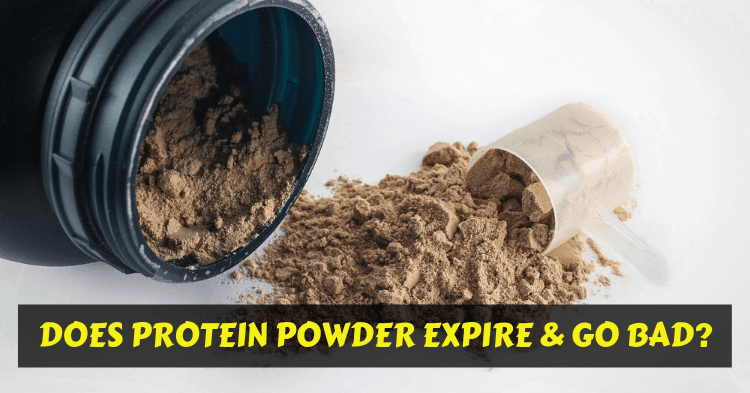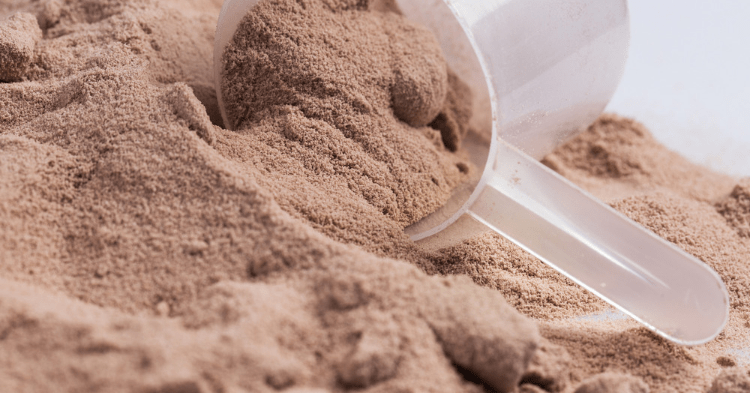
Like any other food product, whey protein can go bad – this usually takes between 1 and 2 years. This depends on when you bought the product and how it was stored by the seller before you bought it.
Contents
Whey: What It Is and Why It Go Bad
It’s important to remember that whey protein powders aren’t some magical product produced in a lab. They’re milk powders and – as dairy – they’re susceptible to spoiling and going bad over time.
This is a normal process and you shouldn’t be too concerned about it since they are likely to have a good shelf-life. The pasteurizing and refining processes remove many of the compounds that make a whey “go bad”, as well as producing better stability.
You’re going to see more significant problems in dairy-based products, as we’re already aware that dairy products are easily spoiled. While the majority of these problems are mitigated during processing, plant based proteins are more resistant to these changes.
If you’re using a plant based protein, these concerns will still apply but they are likely to be reduced, take more time, and the taste is also likely to be less of a problem along the way!
How Long Does Protein Powder Last?
This is a hard question to answer definitively.
It’s going to depend on a whole bunch of factors: the methods the manufacturer used, the types of protein you’re getting (e.g. casein vs whey), how long it took to get from the factory to your shaker, and how it has been stored.

Additionally, you’re going to have a best-before date on most products. This often extends months or years into the future, with supplement companies actively trying to improve the usefulness of their products. This is a key selling point for bigger whey products that may take months or years to use up.
These all affect how long protein powder is good for. Overall, you’re going to want to rely on the manufacturer’s own stamp of best-before. If you’re shopping in person then you can check these on the containers themselves, whereas online purchases should have reviews that discuss this (if it’s a problem).
If a product is consistently short on shelf-life, it is going to be a considerable problem for your overall use. This is something that tends to be noted and criticized if it’s a consistent, significant problem with a brand.
Once opened, you can usually expect a few months of goodness from a protein powder. Many manufacturers’ products last for a year or more, but this does stop being a real concern.
The speed at which you get through a protein powder also makes this less of an issue. If you’re using a protein powder on a daily basis (which is pretty normal), you’re only likely to make use of it for about 1-2 months before it’s all gone.
There’s not usually enough time for a protein powder to go bad – which is why you have to read this article in the first place. If you’re not sure that your protein powder has gone bad, it’s probably because it’s never gone bad fast enough to notice!
What Happens When Protein Powder Expires?
Protein powder doesn’t just go bad all at once. What you’re more likely to notice is a slow decline in the taste and mixability/digestibility of the protein powder over time.
This is because of the fermentation of proteins and the general degradation of the other dairy components. Proteins ferment over time, being broken down through internal processes and interactions with other compounds in a protein powder.
As time goes by, the membranes of the proteins break down, they denature, and ultimately are fed on by bacteria in the air or powder. You’re also likely to lose some of the health-boosting benefits that make milk proteins so great.
These often produce unpleasant side effects from the poor quality proteins and the bacteria themselves.
If you’ve ever smelled bad milk (which we all have), then this is a similar process and experience. It’s the consistent breakdown of these key nutrients that produces changes to the taste, digestion, and benefits of these products.
Can You Use Expired Protein Powder?
Can you? Yes.
Should you? Absolutely not.
The taste of expired protein powder is highly likely to be gross and off-putting. This makes it a real problem to use in a protein shake if it is the main or only ingredient you’re adding to water/milk. If you can keep it down, we’ll be impressed.
The digestive load of this kind of expired protein powder is also probably going to cause issues. Whey proteins can be digestively stressful to start with (especially across different age groups), but a fermented or denatured version is only likely to be worse.
If you’re taking a few scoops of a denatured, old, expired protein then there’s a good chance you’re going to experience aches or “movements” as a result. We don’t recommend this.
Also, when you’re taking in expired protein powder, there’s a good chance that the effects and benefits are compromised. They’re not as digestible and complete as a whey protein at its best – losing all the main benefits over other forms of protein.
When you add these effects up, you’re getting a worse supplement with a worse taste, all with the increased risks of unpleasant toilet trips or stomach aches. These aren’t guaranteed, but they are far more likely than in a new, safer product.
How Can You Tell Your Protein Powder Is Bad?
You can usually tell from the smell and taste – though that’s not a fun experience!
Smelling the product can be a problem since there are often flavors and other compounds in the powder to hide the normal taste of whey, casein, or peas, for example.
The taste, however, is more distinctive. If you’re concerned that you’ve got some off protein powder, the best choice is to make a small shake. Once mixed, you should be able to get a clearer smell and taste.
If it smells like off milk, or some form of gross(er) version of your fav plant protein, it’s a bad product. If you can’t tell from smell, then it’s time to take a sip and see! This is a tough way of figuring it out, but it’s better than making a whole shake and only realizing it’s off halfway through.
There are probably some smarter, scientific ways of testing it, but this is a quick, simple, effective test.
How Can You Store Protein to Stop It Going Bad?
The instructions you’ll normally see on a protein powder container suggest keeping it somewhere cool and dry.
The second part is perhaps the more important – since the powder itself responds badly to moisture and the fermentation/denaturing processes are faster in moisture. This means that you’re going to benefit from keeping it in a cupboard or closet where exposure to sunlight, heat, and humidity are low.
This isn’t going to make a tremendous difference for most people, but it is worth putting it in the same kind of storage space you’d use for other dry foods. Think rice, pasta, etc. and why you store them in kitchen cupboards.
You also need to make sure you’re diligently sealing the container after use. This reduces two of the key factors in protein breakdown – moisture and heat. For this purpose, screw-top containers are usually better than pouches, especially if you get powder in the seal itself.
Protein powder benefits from this kind of care, too, and should be placed with other foods. As we said at the start, whey is just milk powder – you need to treat it like a food, not like pre-workout or other more heavily-processed supplements.